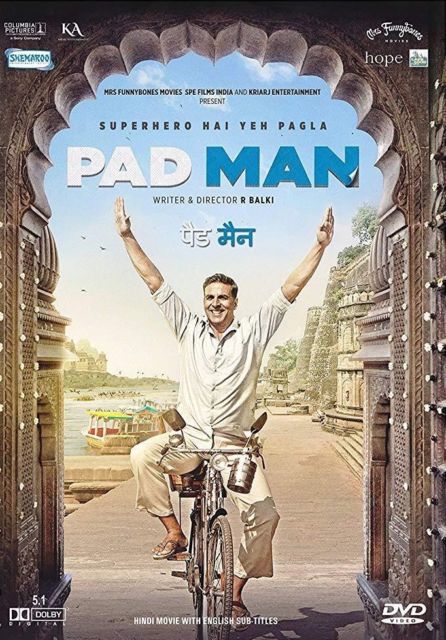“Unlikely, Inspiring Success Story”

| None | Light | Moderate | Heavy | |
|---|---|---|---|---|
| Language | ||||
| Violence | ||||
| Sex | ||||
| Nudity |
What You Need To Know:
PAD MAN tackles its subject matter tastefully, making it suitable for mature audience members. Even with a lengthy runtime and mature subject matter, the movie has an incredible amount of heart that makes viewers smile. Moviegoers should be aware, however, of the movie’s Hindu references and influences. Characters pray to Hindu shrines and go to Hindu temples. The main message of PAD MAN, is improving respect between men and women, doing good for the community and pursuing selfless goals.
Content:
Strong Hindu worldview with characters praying to shrines throughout the movie, people going to Hindu temple, Hindus giving offerings to Hanuman, and Hindus asking for Lord Krishna’s blessing but movie has strong moral premise and moral themes about doing unto others and foregoing the love of money, plus protagonist asks a group of Catholic nuns to test out his sanitary napkins and they tell him to “Ask Jesus” as a joke;
Three obscenities, one “oh my god” profanity, and a few mild puns and humor around providing rural women with cheaper, healthy sanitary napkins;
A character slices his arm in a welding accident, drunken man picks a fight with the protagonist, and protagonist gets goat’s blood on his pants while testing his invention;
A husband and wife kiss under a bed, and protagonist tests out his invention using women’s pink panties;
A man receives a shirtless massage;
Drinking champagne at a party to celebrate, a drunk character references drinking a full bottle of wine, a drunk character picks a fight with protagonist;
No smoking or drugs; and,
Mature thematic material dealing with bodily functions.
More Detail:
Lakshmikant Chauhan is the perfect husband who would do anything for his wife. He’s also a talented and smarter-than-average welder and inventor who often creates gadgets that makes her life easier. In his village in 2001, it’s still customary for the women to go outside and remove themselves from society for the five days of their periods. When Lakshmi realizes his wife is using a dirty rag instead of sanitary products, and a doctor confirms that this could lead to serious health issues, he insists she use sanitary napkins instead. At that time in India, however, sanitary napkins were far too expensive to justify monthly use, so Lakshmi sets out to invent a more cost-effective version.
Lakshmi hits obstacle after obstacle due to the shame of the community surrounding his endeavor. He can’t find anyone who will help him test the product, not even his own wife who becomes embarrassed and ashamed by his increasingly desperate attempts. Even after his wife leaves him and he’s shunned by his entire village, Lakshmi still believes in his cause. He teams up with a young female entrepreneur to perfect the invention, making women healthier and creating jobs in the process.
It would be easy to dismiss the movie, or caution viewers against the subject matter, but that’s exactly the point of PAD MAN. It takes a natural, women’s health issue and puts it in the spotlight, yet does so in a very discreet and respectful manner. There is no “toilet” humor in the movie, or unnecessary content, just a sincere effort to make women feel less shameful and men more empathetic. Themes of respect between men and women echo throughout the story, and Lakshmi shines as a great example of what a biblical husband should look like in caring for his wife. Even after she leaves him, he remains faithful to her and extends his cause past just one woman but recognizes a great need for all the women of India.
For American audiences, there’s a bit of adjustment to Bollywood style. Indian movies tend to be on the longer side and more melodramatic with various musical interludes. Considering the 140-minute runtime, this movie should have felt much longer than it did. Once it gets going, it doesn’t seem to drag, although some time could have been shaved off of the first half of the movie. A half hour could have been cut without complaint, yet the movie never really seems slow-paced. It has some nice shots and decent cinematography, even though it’s overuse of the zoom function is especially distracting at times. Viewers should also be cautioned against strong Hindu presence in the movie, as the characters pray, go to the temple and give offerings to various Hindu gods.
Overall, the movie is memorable as a fun, entertaining, and hopeful story of a good man trying to do a good thing. It’s refreshing to see a protagonist who has such a good heart, with no goal other than to make the world a better place. At first, he does what he does for his wife, but even after she leaves him, he continues his mission because he believes in his cause. He even makes it clear he has no intention of patenting or selling his machine or making any profit whatsoever. He gives a particularly moving speech toward the end, urging other entrepreneurs to value “doing good” over monetary gain. “Money can make one man smile, but doing good can make many women smile,” he says. This type of counter-cultural entrepreneurial spirit is refreshing to see, especially since he never gives up hope despite the stigmas in his culture against his mission.


 - Content:
- Content: 

